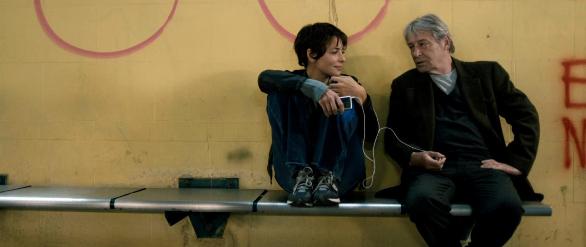Miele takes itself very seriously. Irene (Jasmine Trinca) does, at least. As far as her father and boyfriend know, she’s working hard on her dissertation. However, she lives a double life as Miele (Italian for Honey); she’s an angel of death, a freelance euthanasiaste. (A word that I rather hope never becomes common currency.) She picks up referrals from doctors; helpless in the face of the rules that usually regulate conduct in these matters, Irene helps their terminally ill patients transition to the other side, with dignity. There’s no doubt Irene believes that she is doing the right thing; but right or not, her work is also difficult, complex and the repository of remarkable power. Whether she takes all these complications into account is another matter. But you know how it is with the young; they see everything in black and white, or so we are given to understand.
It is only a matter of time before she reaches the limits of her moral code; Grimaldi (Carlo Cecchi), with no apparent terminal ailment but who nonetheless wants to end his life. “The sick don’t have more rights than me,” he points out, not unreasonably. His ennui appalls Irene at first – not least because he has tricked out of her the cocktail of drugs she uses for her work – but then begins to worm its way into her consciousness. When is it ever right to help another person die?
Valeria Golino (Tom Cruise’s girlfriend in Rain Man, many many moons ago; she since had a prolific acting career in Europe) works hard at evoking the right tone in Miele, her first film as a director. Irene/Miele embodies articulate rebellion against the bourgeois norms of modern life; literate and principled agitation that that both feeds from and fuels intellectual and emotional independence. Golino’s directorial instincts capture the sentiment well; a left field soundtrack, long moments of thoughtful quiescence, a rarely static camera.
But the narrative itself is less certain; it isn’t just Irene/Miele’s predictable back story that allows the tension to slacken somewhat, but the engagement between her and Grimaldi, with tones of grizzled wisdom outweighing youth and enthusiasm, seemed somewhat synthetic at times. Miele is a likeable enough film, but does not possess the heft that it promises. But, at least, it isn’t cynical; Europeans, unlike Israelis, don’t do cynicism terribly well. Which may or may not be a good thing.
Miele (Honey)
Directed by Valeria Golino
Starring Jasmine Trinca, Carlo Cecchi, Libero De Rienzo
96 mins, Italian and English w. Hebrew and English subtitles.






